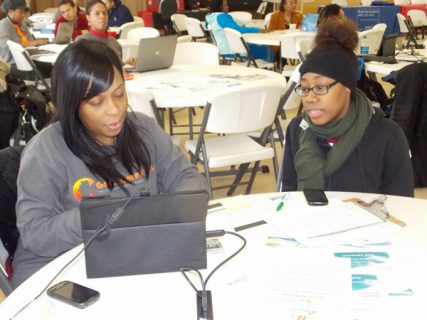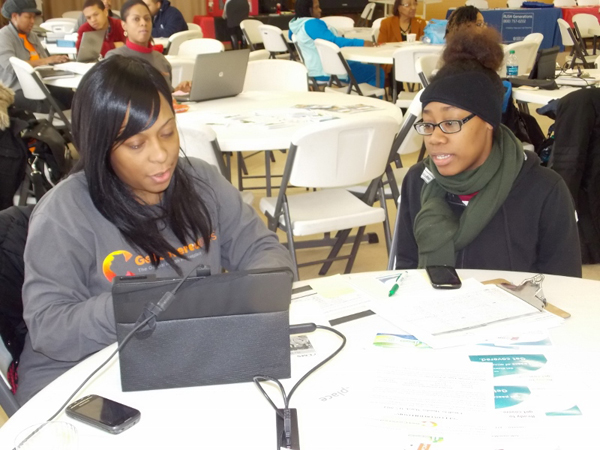WASHINGTON (RNS) On one Friday earlier this month, more than 11,000 Muslims in mosques across the country heard a sermon about the Affordable Care Act.

The National Council of Jewish Women Sacramento Section hosted tables with information about health coverage. Photo courtesy of National Council of Jewish Women
Hindu and National Baptist groups, meanwhile, are posting online announcements about the White House’s “Faith and Community ACA Days of Action” this weekend (March 21-23).
Jewish women’s groups have visited college campuses to get students who think they’re “invincible” to sign up for health insurance.
As the national March 31 deadline for health insurance enrollment looms and with President Obama’s encouragement, organizations across a range of faiths are working to sign up uninsured Americans for coverage under Obamacare.
“What other time in our history will we be able to help our communities focus on wellness, to help every citizen access a means to be healthy and treat medical conditions, breaking the trend of making emergency rooms and ‘urgent care’ our primary care physicians?” asked Jacquelyn Dupont-Walker, director of the African Methodist Episcopal Church’s Social Action Commission.
Her historically black denomination has been involved in 5,000 events as part of a “saturation” campaign that has included rural areas and urban centers. In Georgia alone, a state whose Republican governor has critiqued Obamacare as “anything but affordable,” a team of enrollment experts has visited each of the state’s 600 AME churches.

April Caldwell, right, age 19, successfully enrolls in Medicaid with help from Latonya Rover, a counselor for Beloved Community Family Wellness Center, at a Get Covered America health care enrollment event at the Allen Metropolitan CME Church in Chicago. Photo courtesy of Get Covered America
Enroll America, a nonprofit advocacy group with a “Get Covered America” campaign, has partnered with faith-based groups representing more than 20 million members, said spokesman Justin Nisly. Much of their work is focused on 11 states with high concentrations of uninsured people, and has found willing partners in the National Council of Jewish Women, the group American Muslim Health Professionals and NETWORK, the Catholic social justice group.
“We’ve hosted over 700 outreach and enrollment events at churches, mosques, synagogues and faith centers to engage communities to learn about the options that are available to them,” Nisly said.
Faith leaders have promoted Enroll America’s “Health Care in the Pulpit” program, which includes training volunteers and having information tables after worship services.
PICO National Network, a consortium of faith-based community organizations, has a “Bring Health Care Home” initiative with education or enrollment events planned through March 30. As of mid-March, its member congregations hosted 157 events and reached more than 92,000 people who were either uninsured or likely did not have insurance.
Though experts say it’s impossible to say how many of the 5 million newly enrolled Americans signed up as a result of a religious recruitment effort, the White House views religious leaders as key players. More than 20,000 people participated in webinars that have been hosted by the Department of Health and Human Services’ faith-based office, and Obama joined a March 10 conference call to ask religious officials to reinforce their efforts.
The sign-up campaigns come against a backdrop of deep opposition to the law in some religious corners, fueled by a sense that the law interjects government into people’s private lives, or widespread religious aversion to a controversial contraception mandate included in the new law. The Supreme Court will hear a central challenge to the mandate on March 25.
The Rev. Gabriel Salguero, president of the National Latino Evangelical Coalition, has spearheaded information sessions at predominantly Latino churches around the country and radio spots on Hispanic Christian radio stations.
Salguero noted that one in four persons who are eligible but uninsured are Latino. “It’s an urgent need in our community,” he said. “It’s a real service to that underserved community.”

Linda Perkins, right, a DC Health Link certified assister, enrolls a local resident into a qualified health plan in an office of the African Methodist Episcopal Church in Washington, D.C. Photo courtesy of African Methodist Episcopal Church, Second Episcopal District
Salguero said he shares other evangelicals’ concerns about Obamacare’s coverage for what they consider to be abortifacients but nevertheless wants to make sure people have a chance to be educated about what the law does and does not include.
“My position is I’m a pro-life person so I don’t want anybody dying of preventable diseases if they can get health care,” he said.
Likewise, in a rare move, the Roman Catholic bishop of San Bernardino, Calif., wrote a letter that was read at Masses in his diocese on March 15-16, noting that undocumented parents should “sign your child up for health insurance immediately” and that opting out could result in fines that will increase over time.
“It is true that our Church has raised objection to elements of the law that relate to contraception and abortion services that might be provided through it,” Bishop Gerald R. Barnes wrote in the March 11 letter, adding that he “fully” supports those objections.
“However, these factors do not mean that we, as Catholics, should disobey the new health care law. If we happen to have an insurance plan that includes services that are objectionable to our faith, which most plans in California do, our response is to not utilize these services.”
The Rev. Gary R. Gunderson, a public health science professor who has worked with the Bush and Obama administrations, said faith groups are key on-the-ground partners in the enrollment push because they often work with the most vulnerable populations.
Gunderson, who teaches at Wake Forest University Divinity School and is a vice president at its related Baptist medical center, recalled a contract worker who told him he was grateful for the health insurance he now had under the Affordable Care Act even though he is a Republican and didn’t vote for Obama.
“The ministry trumps the politics,” Gunderson said. “Signing up for the Affordable Care Act is not like drinking alcohol. It’s not a sin.”
KRE/MG END BANKS





